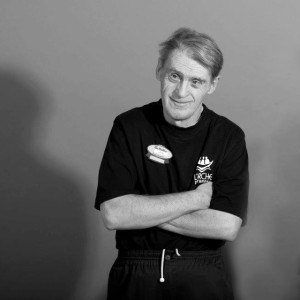Listening to the Voice of the Unexpected

Trish Glennon and John Smeltzer
This particular night however, I was too tired, too exhausted to think about my usual response. So, when Frances asked me to say I’m sorry—I simply said: “I’m sorry Frances.” Frances then replied: “No Mama, you have to say all the words, you have to say the whole thing. You have to say ‘Frances, I’m sorry that I got mad at you and I’m sorry I was rude to you and hurt your feelings.” With no energy to think through my response, I simply did, what Frances asked me to do. I said that I was sorry, I used all the words, I said the whole thing—no ifs, ands, or buts.
I lay waiting for Frances response—what else will she ask me I thought. But, Frances said nothing, she just put her arms around me and held me very tight for what seemed like a long time. And then she whispered in my ear, “you’re the best mom in the whole world.”
Frances had been waiting—waiting for me—waiting for the words—particular words that once spoken bore the truth of love and forgiveness—words her heart longed to hear before she could face the darkness of the night. As I lay next her, with her tightly clinging to me, I unknowingly had been waiting too—my heart needed to hear that I am forgiven, that I am too loved.
The season of advent offers us an important invitation—to wait. It is the season of waiting. For most of us, this invitation to wait is an especially challenging one for this time of year. The weeks leading up to Christmas are some of the busiest and most stressful times—there is much to do, to plan for, to prepare. Waiting, especially now, is not helpful, and frankly at times frustrating.
One of my favorite Christmas waiting moments happened some years ago on Christmas eve. John Smeltzer and I were travelling together to the States. We were dropped off at the airport and it would be an understatement to say it was busy. It was frenetic, loud, packed, with lines of people winding everywhere. John and I got to the back of the endless line. I was feeling anxious just thinking about whether we would ever make through in time for our flight. John, had a different take on things. There were people to meet, the potential for business cards was huge. John found the first Air Canada employee who was clearly looking tired and stressed and doing his best to keep the line of people orderly. John greeted him with his usual “how are ya,” a few stiff pats on the back, and a repeated `good job.` The man`s demeanor completely changed—he was now chatting with us, laughing, warm. And, then, John asked him for his business card. The man for a brief moment stood speechless and looked astonished, he then started laughing—I`m not that important` he said. But, he was clearly pleased—he kept thanking John and shaking his hand. A few minutes later he came back to us and escorted us to the front of the line.John lived the moments of waiting as he always does, present to the people around him. John spoke the words that this man clearly needed to hear in that moment—John spoke words that communicated to the man that he was important, he was somebody—he was doing a good job.
Trusting in God’s light, can we walk in darkness, surrendering to the journey, and listen attentively to our hearts deepest desire. Like the voice of the unexpected traveller, who catches us off guard, who announces to us our worth, who communicates to us that we matter, the voice of God will find us and meet us there in that place of deep longing.
~ Trish Glennon is a long-time member of L’Arche Daybreak. She wrote this reflection during Advent for our Carol Eve Service at the Dayspring, December 2013. She lives with her husband Steve and their 3 children near the community. While Advent is a Christian tradition it has also become a community tradition at Daybreak for people of all faiths as well as for people with no particular faith tradition. For us, it is a time of reflection, story-telling, and ritual.
© 2023 Copyright L'Arche Daybreak
WordPress Website Support by IDL Web Inc




